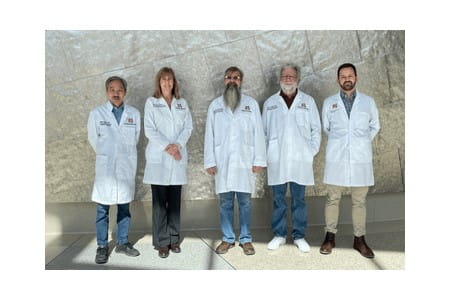According to the United States Centers for Disease Control and Prevention, approximately 40,000 babies are born with congenital heart defects annually in the U.S. Congenital heart defects range in severity, with some conditions requiring surgery and other medical interventions. But despite their prevalence, the underlying causes of these conditions are poorly understood.
“I think I can speak for everyone on our team about how fortunate we feel to continue to have an opportunity to really dive into the mechanisms of ventricular morphogenesis,” said Anthony Firulli, PhD, Carleton Buehl McCulloch Professor of Pediatrics, and the grant’s lead principal investigator. “The Wells Center’s cardiac developmental biology and cardiovascular genetics research groups share a common goal—to help families have better resources to combat congenital heart defects. It is a real privilege to work in a collaborative and dynamic environment as we embark on such important research.”
Researchers will use the renewed funding to continue studying the molecular mechanisms of how the heart’s ventricles form, gaining insight into how the heart develops and grows during development.
The grant consists of four Projects.
- Project 1 will focus on the mechanisms that contribute to severe cases of congenital heart defects—specifically, how mutations in a gene called ZIC3, which causes heart defects in males, result in a wide variety of congenital heart defect types. These studies build on work led by Stephanie Ware, MD, PhD, professor of pediatrics and interim chair for the IU School of Medicine Department of Medical and Molecular Genetics.
- Project 2 will study the epigenetic mechanisms regulating the gene HAND1 and its role in the development of the heart’s left ventricle, papillary muscle and cardiac conduction system. This project will expand on laboratory work led by Firulli.
- Project 3, which builds on work led by professor of pediatrics Weinian Shou, PhD, aims to understand the protein SMYD4 and its significance in mesendoderm cells and cardiac progenitor cells, which are cells critical to heart development.
- Project 4 will investigate the protein SHROOM3 and its interactions within the planar cell polarity pathway, which is important for normal heart development. These studies will strengthen previous research led by assistant professor of pediatrics Matthew Durbin, MD, MS.
The projects will be reinforced by the participation of three cores, with additional expertise from professors of pediatrics Lei Yang, PhD, and Loren Field, PhD, and associate professor of pediatrics Michael Rubart-von der Lohe, MD. Overall, the research made possible by the grant will shed light on why congenital heart defects occur and how they may be prevented and treated in the future.
“Renewal of this grant provides an incredible opportunity to continue our investigation of the underlying causes of congenital heart defects. Over the past five years, we have learned a great deal about how heart development is controlled, and over the next five years, we will expand these studies to investigate signals early in development that instruct cells to become part of the heart as well as signals that unlock the genetic blueprint for heart formation,” Ware said. “It is an exciting time to be doing congenital heart defects research because we are able to see results translated to the clinic where we can now test infants at birth for genetic causes of these defects and gain an earlier understanding of additional potential medical concerns. We hope that our research on the causes of congenital heart defects will lead to additional management options and therapies.”
